Mo Brooks calls for Anthony Fauci’s termination in midst of controversial email release
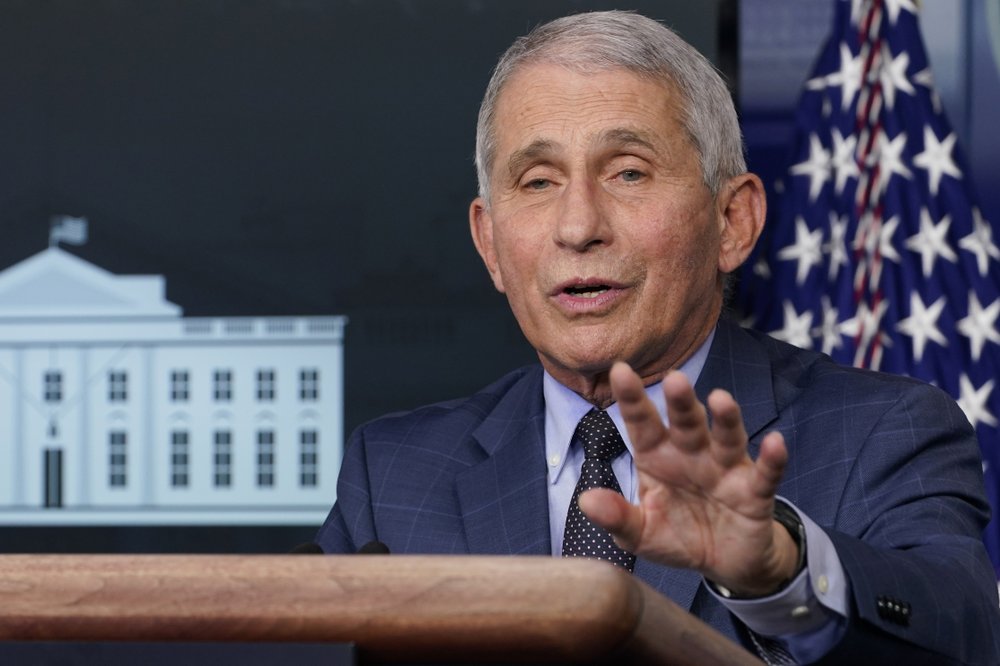
Dr. Anthony Fauci, arguably America’s most well-recognized health official in the battle against COVID-19, assumed a central role in political controversy following a newly released slough of last year’s emails, giving rise to concerns about COVID-19’s origin and the controversial scientific research U.S taxpayers have funded. Yesterday, Congressman Mo Brooks (AL-05) joined several of his colleagues in a news conference to discuss auditing the correspondence and financial statements of Dr. Fauci. Fauci is no stranger to the spotlight, as the immunologist was one of the world’s most frequently-cited scientists across all scientific journals from 1983 to 2002, in addition to the world’s 10th most-cited HIV/AIDS researcher from 1996-2006. He has advised seven Presidents and was awarded a Presidential Medal of Freedom by President George H.W. Bush in 2008 for his efforts on an AIDS relief program. Serving as director of the National Institute of Allergy and Infectious Diseases (NIAID) since 1984, Fauci is perhaps more widely recognized for leading the nation’s COVID-19 response as a White House coronavirus advisor during the Trump Administration. He continues to lead the nation’s pandemic response during his current role as chief medical advisor in the Biden Administration. However, Fauci’s consistently shifting narratives throughout the pandemic, in addition to frequent opposition towards President Donald Trump’s leadership, resulted in a sizable number of public critics, many of which included Trump White House officials. Peter Navarro, a Harvard-trained economist and China hawk who served as a top trade and economic policy advisor to President Trump, publicly criticized Dr. Fauci in a USA Today op-ed, outlining the many instances Fauci was mistaken during the pandemic. USA Today promptly attached a remorseful precursor to the article; an apologetic note addressed to readers for publishing any criticism of Fauci. One of the most notable examples Navarro specifies is the predictive memos he sent in January and February 2020, which grimly anticipated COVID-19 to be a deadly and impactful global pandemic. Senior officials shrugged off these warnings, including Fauci, due to Navarro’s hawkish views on China. “The lack of immune protection or an existing cure or vaccine would leave Americans defenseless in the case of a full-blown coronavirus outbreak on US soil,” Navarro’s January 29 memo to the National Security Council states. “The lack of protection elevates the risk of the coronavirus evolving into a full-blown pandemic, imperiling the lives of millions of Americans.” Weeks after Navarro’s warning was sent out, Fauci assured the media just how worried the American people should be about the pandemic when he expressed, “The danger of getting coronavirus now is just minusculely low,” Fauci stated. “As of today, on the 17th of February, the risk is really relatively low.” Since then, public criticism of Fauci continues to escalate as 3,000 pages of his emails from March and April 2020 were obtained under the Freedom of Information Act (FOIA) following a lawsuit filed by taxpayer watchdog group, the White Coast Waste Project. “Taxpayers have a right to know what the NIH knew about how its money was being spent at the Wuhan animal lab, and what NIH knew about a potential lab leak in late 2019 and early 2020,” stated Justin Goodman, vice president of advocacy and public policy at the White Coat Waste Project. “Transparency and accountability at home and abroad are critical in the quest to identify the origin of the COVID-19 pandemic in order to prevent another outbreak.” Fauci’s obtained emails point to the fact that he was indeed warned of the possibility that COVID-19 was engineered, a theory he remained adamantly opposed to throughout the pandemic. Kristian Andersen, the head of a viral genomics lab at Scripps Research in La Jolla, CA, emailed Fauci in February 2020 entertaining the possibility of COVID-19’s lab-based origin, “The unusual features of the virus make up a really small part of the genome (<0.1%) so one has to look really closely at all the sequences to see that some of the features (potentially) look engineered.” This week, Anderson addressed his involvement in these recently released emails, assuring that his newfound research discourages any lab-based scenarios while also claiming it is scientifically impossible to determine the origins of the pandemic, “As we stated in our article last March, it is currently impossible to prove or disprove specific hypotheses of SARS-CoV-2 origin.” Additionally, these emails raise questions surrounding the type of research U.S. taxpayers are funding. Under Fauci’s four-decade-long leadership, the NAIAD resides within the National Institute of Health (NIH), which allocates 80% of its federal funds to scientific research, including grants to foreign organizations. Fauci swore under oath that no taxpayer funds were used to fund research in Wuhan. However, in a later congressional hearing, he stated that the NIH earmarked $600,000 to study coronaviruses in Wuhan. NIH Director Dr. Francis Collins confirmed that $3.7 million in federal funds were sent to EcoHealth Alliance, a global nonprofit, of which $600,000 went to the Wuhan Institute of Virology (WIV). Fauci’s emails show a message received from the President of EcoHealth Alliance, Peter Daszak, thanking him for rejecting any lab-leak theories in April 2020. Daszak wrote to Fauci, “I just wanted to say a personal thank you on behalf of our staff and collaborators, for publicly standing up and stating that the scientific evidence supports a natural origin for COVID-19 from a bat-to-human spillover, not a lab release from the Wuhan Institute of Virology.” Daszak adds, “Your comments are brave, and coming from your trusted voice, will help dispel the myths being spun around the virus’ origins.” These concerns have led Congressional Republicans, including House Minority Leader Kevin McCarthy (R-CA), to call for Fauci’s dismissal from his role as NIAID director. Yesterday, Congressman Mo Brooks joined GOP lawmakers in a press conference to announce his support of the Fire Fauci Act. The bill would bring Dr. Fauci’s taxpayer salary to $0 and will require the Senate to confirm another individual to fill his position. “Dr. Fauci is consistent in just one thing and that is inconsistency,” Brooks said. “Why
Alabama leaders join colleagues to address current border crisis

Alabama may not have a border crisis of its own, but leaders are actively working with states like Arizona, Texas, and California to keep the issue relevant. President Joe Biden has lifted several sanctions set by former President Donald Trump, but some of those reversals have caused issues along the border. Title 42 was a policy Trump enacted that allowed border agents to turn away migrants without giving them a chance to apply for protection in the U.S., reported The New York Times. However, Biden’s reversal of this policy has caused a huge surge of migrants sending their children to the border alone since he hasn’t been turning away minors. Most single adults and families continue to be immediately turned around. In April, Rep. Gary Palmer and House Republican Leader Kevin McCarthy sent an open letter to Vice President Kamala Harris to express the ongoing concerns of House Members regarding the humanitarian crisis at the U.S. southern border. “We are witnessing a serious crisis at our border. Facilities are overflowing, conditions are terrible, and children are being left abandoned at the border,” Palmer said. “All of this can be directly linked to this Administration’s easing of necessary border protections and open border rhetoric. The Homeland Security Secretary recently confirmed that the agency is ‘on pace to encounter more individuals at the southwest border than we have in the last 20 years.’ Despite all of this, Vice President Harris has yet to make a visit to the border or comment at length on the crisis there, even though she was tapped by the President to lead efforts in addressing it a month ago. It is time for this Administration to acknowledge the problem that it has created and to work with Congress to resolve it. The testimonies and policy solutions compiled by the Republican Policy Committee offer a commonsense place to start.” This week, Rep. Barry Moore visited the border near El Paso, Texas. He posted a video on Twitter and stated, “If Biden wants to “build back better,” he should start with the border wall.” If Biden wants to “build back better,” he should start with the Border Wall. pic.twitter.com/n2oKFiUQAo — Rep. Barry Moore (@RepBarryMoore) May 25, 2021 HAPPENING NOW: My colleagues and I are in El Paso at our Southern Border giving you a live update. Tune in NOW! https://t.co/myHMel8FMe — Rep. Barry Moore (@RepBarryMoore) May 24, 2021 Earlier this month, Jerry Carl stated on Twitter, “I just spent several days at the border learning directly from law enforcement about what needs to be done to fix the #BidenBorderCrisis.” I just spent several days at the border learning directly from law enforcement about what needs to be done to fix the #BidenBorderCrisis. Read my thoughts here: https://t.co/xhxhqGbmsJ — Rep. Jerry Carl (@RepJerryCarl) May 13, 2021 Mo Brooks stated on Twitter, “The Socialists are eerily quiet about the #BidenBorderCrisis, but it’s still a problem that Joe Biden refuses to accept responsibility for creating. Joe Biden’s promise of amnesty and citizenship for illegal aliens enticed the tsunamis of illegal aliens breaking into America.” The Socialists are eerily quiet about the #BidenBorderCrisis, but it’s still a problem that Joe Biden refuses to accept responsibility for creating. Joe Biden’s promise of amnesty and citizenship for illegal aliens enticed the tsunamis of illegal aliens breaking into America. pic.twitter.com/8WvOwKTBnE — Mo Brooks (@RepMoBrooks) May 25, 2021
House votes to create panel to probe Jan. 6 insurrection
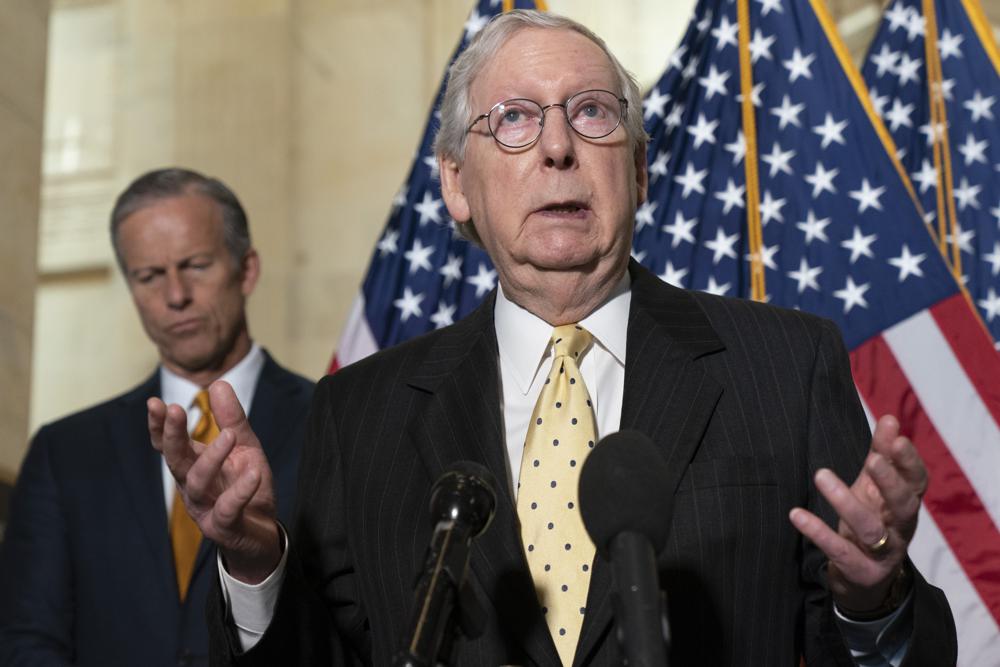
The House voted Wednesday to create an independent commission on the deadly Jan. 6 insurrection at the U.S. Capitol, sending the legislation to an uncertain future in the Senate as Republicans increasingly line up against the bipartisan investigation and align themselves with former President Donald Trump. Democrats say an independent investigation is crucial to reckoning what happened that day when a violent mob of Trump’s supporters smashed into the Capitol to try and overturn President Joe Biden’s victory. Modeled after the investigation into the Sept. 11, 2001, attacks, the legislation would establish an independent, 10-member commission that would make recommendations by the end of the year for securing the Capitol and preventing another insurrection. It passed the House 252-175. But top Republicans in Congress are working to stop it. Senate Republican leader Mitch McConnell said Wednesday morning that he will oppose the legislation, joining with House GOP leader Kevin McCarthy, who came out against it Tuesday. Both men claimed the bill was partisan, even though membership of the proposed commission would be evenly split between the parties. The January insurrection has become an increasingly fraught topic for Republicans, with a growing number in the party downplaying the severity of the worst attack on the Capitol in more than 200 years. While most Republicans voted against forming the commission, only a few spoke on the floor against it. And a handful of Republicans who backed the commission spoke forcefully. “This is about facts — it’s not partisan politics,” said New York Rep. John Katko, the top Republican on the House Homeland Security Committee who negotiated the legislation with Democrats. He said, “the American people and the Capitol Police deserve answers, and action as soon as possible to ensure that nothing like this ever happens again.” Rep. Fred Upton, R-Mich., said that Jan. 6 “is going to haunt this institution for a long, long time” and that a commission is necessary to find the truth about what happened. He recalled that he “heard the shouts, saw the flash-bangs, smelled the gas on that sorry day.” Democrats grew angry as some Republicans suggested the commission was only intended to smear Trump. Several shared their own memories of the insurrection, when rioters brutally beat police, broke in through windows and doors, and sent lawmakers running. Four of the rioters died, including a woman who was shot and killed by police as she tried to break into the House chamber. A Capitol Police officer collapsed and died after engaging with the protesters, and two officers took their own lives in the days after. “We have people scaling the Capitol, hitting the Capitol Police with lead pipes across the head, and we can’t get bipartisanship? What else has to happen in this country?” shouted Rep. Tim Ryan, D-Ohio, on the floor just before the vote. He said the GOP opposition is “a slap in the face to every rank and file cop in the United States.” The vote was yet another test of Republican loyalty to Trump, whose grip on the party remains strong despite his election defeat. House Republicans booted Wyoming Rep. Liz Cheney from their leadership last week for her criticism of Trump’s false claims, installing a Trump loyalist in her place. Cheney, in turn, suggested to ABC News that a commission could subpoena McCarthy because he spoke to Trump during the insurrection. House Speaker Nancy Pelosi, D-Calif., called McCarthy’s opposition to the commission “cowardice.” She released a February letter from the GOP leader in which he asked for an even split of Democrats and Republican commissioners, equal subpoena power, and no predetermined findings or conclusions. The bipartisan legislation accommodates all three of those requests, she said. “Leader McCarthy won’t take yes for an answer,” she said. In the Senate, McConnell’s announcement dimmed the prospects for passage. But Senate Majority Leader Chuck Schumer, D-N.Y., vowed to force a vote on the bill, charging that Republicans are “caving” to Trump. Schumer said that Republicans are trying to “sabotage the commission” and are “drunk” off Trump’s baseless claim that the election was stolen from him. That false assertion, repeated by the mob as the rioters broke into the Capitol, has been rebuked by numerous courts, bipartisan election officials across the country, and Trump’s own attorney general. Trump released a statement Tuesday night urging Republicans to oppose the commission, calling it a “Democrat trap.” Like in the House, some Senate Republicans have suggested they will support the legislation. Utah Sen. Mitt Romney said Tuesday that given the violent attack, “we should understand what mistakes were made and how we could prevent them from happening again.” Louisiana Sen. Bill Cassidy said he doesn’t agree with McConnell that the bill is slanted toward Democrats and “I’m inclined to support it.” Maine Sen. Susan Collins, a Republican, said that she supports the idea of a commission but that the House bill would need adjustments. Others have pushed their colleagues to oppose the commission. Missouri Sen. Roy Blunt, the top Republican on the Senate Rules Committee, is working on a report with his Democratic colleagues that will include recommendations for security upgrades. He said an independent investigation would take too long and “frankly, I don’t think there are that many gaps to be filled in on what happened on Jan. 6, as it relates to building security.” South Dakota Sen. John Thune, the No. 2 Republican in the Senate, cited concern in the caucus that the investigation could be “weaponized politically” in the 2022 election cycle. “I want our midterm message to be about the kinds of issues that the American people are dealing with,” Thune said. “It’s jobs and wages and the economy, national security, safe streets, strong borders and those types of issues, and not relitigating the 2020 election.” Separately Wednesday, aides to Rep. Jamie Raskin, D-Md., circulated a letter they said was from a group of around 40-50 anonymous U.S. Capitol Police officers who had been speaking with the congressman. “It is inconceivable that some of the Members we
Joe Biden, GOP senators upbeat, plan more infrastructure talks
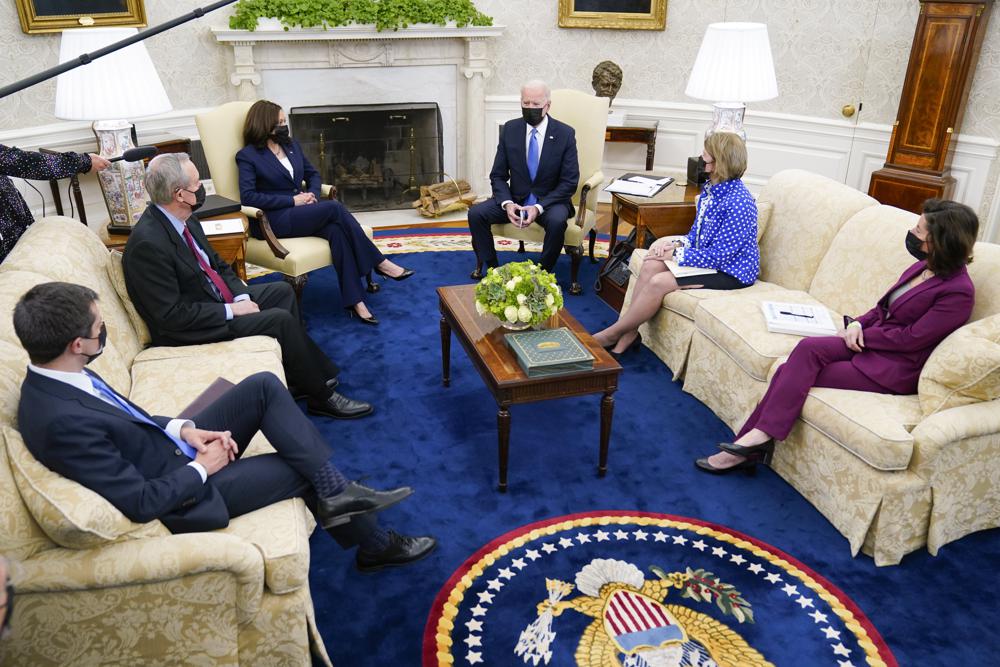
After meeting at the White House, President Joe Biden and a group of Republican senators agreed to talk again early next week as negotiations intensified Thursday over a potentially bipartisan infrastructure package that could become one piece of the administration’s ambitious $4 trillion public investment plan. The GOP senators exited the more than 90-minute meeting “encouraged” about their discussions with the president and prepared to build on the $568 billion proposal they had put forward last month as an alternative to his sweeping American jobs and families plans. “The president asked us to come back and rework an offer so that he could then react to that,” said Sen. Shelley Moore Capito of West Virginia, who is leading the group. “We’re very encouraged,” she told reporters outside the White House. “The attitude the president had in the Oval Office with us was very supportive and desirous of striking a deal.” Biden also emerged upbeat. “I am very optimistic that we can reach a reasonable agreement — and even if we don’t it’s been a good-faith effort,” Biden said in the Rose Garden. Biden is intent on at least trying to strike a deal with Republicans rather than simply going it alone with a Democrats-only bill, which might in some ways be a more politically viable route in a Congress held by the president’s party with only the slimmest of majorities. One strategy that appears to be coming into focus would be for Biden to negotiate a more limited, traditional infrastructure bill of roads, highways, bridges, and broadband as a bipartisan effort. Then, Democrats could try to muscle through the remainder of Biden’s priorities on climate investments and the so-called human infrastructure of child care, education, and hospitals on their own. “I’m willing to negotiate,” Biden said earlier at the White House. But the president has indicated that he’s not about to wait indefinitely for a compromise that may or may not come, and reiterated his view Thursday that “doing nothing is not an option.” The White House said the president stressed that inaction was a “red line for him.” He set a Memorial Day deadline for progress on a bipartisan deal. Those gathered included some of the top-ranking Republicans — Sens. John Barrasso of Wyoming, Roy Blunt of Missouri, Mike Crapo of Idaho, Pat Toomey of Pennsylvania, and Roger Wicker of Mississippi. Joining Biden were Vice President Kamala Harris, Transportation Secretary Pete Buttigieg, and Commerce Secretary Gina Raimondo. Thursday’s meeting followed a lengthy session at the White House with the congressional leadership the day before. Republican leader Mitch McConnell has said his side will accept spending as much as $800 billion, but Republicans made it clear they would refuse to embrace Biden’s broad proposals or his idea of raising taxes on corporations and the wealthy to pay for the plans. The White House outreach is part political strategy, part practical legislating. Striking a deal with Republicans would give all sides a political win — a rare bipartisan accomplishment — without fully forfeiting the president’s broader goals, which are largely shared by Democrats. It also acknowledges the “red line” that McConnell has drawn agaiTfnst GOP votes for undoing the 2017 tax law by raising taxes on corporations or those earning more than $400,000. “I want to get a bipartisan deal on as much as we can get a bipartisan deal on — and that means roads, bridges, broadband, all infrastructure,” Biden said Wednesday on MSNBC. “And then fight over what’s left and see if I can get it done without Republicans if need be.” Capito has taken the lead for Senate Republicans, keeping in close contact with both the president’s team and McConnell, she said, as she shuttles between the White House and Capitol Hill. The West Virginia senator is no stranger to the legislative process, serving more than a decade in the House and now as the ranking Republican on the Senate Energy and Public Works Committee. She ushered a $35 billion bipartisan water resources bill to passage in the Senate and is hard at work with the panel’s Democratic chairman, Tom Carper of Delaware, a Biden ally, on a big surface transportation bill. Biden personally reached out to Capito late last week after the water bill cleared the Senate. “The president he expressed on the phone with me, and has with others, that you know he’s anxious to move forward,” she said. “His desire is to define where we have common ground and I think we’ll probably spend the bulk of the time talking about that.” Biden has insisted he doesn’t want working-class Americans to bear the “burden” of paying for all the new infrastructure investments alone, resisting GOP plans for taxes and user fees, like tolls, to fund the projects. One potential new funding source could be the more than $1 trillion in unpaid taxes each year. House Speaker Nancy Pelosi has mentioned tapping that potential funding source and she said Biden discussed it at their meeting Wednesday. Republicans have not resisted it. “That’s a big chunk that would go a long way,” she said Thursday. McConnell and House Republican leader Kevin McCarthy have insisted they want the infrastructure bills to go through the committee process, where lawmakers can hammer out the details and take ownership of the proposals, rather than have the package negotiated in their leadership suites. Republished with the permission of the Associated Press.
Liz Cheney says Donald Trump and GOP backers threaten democracy
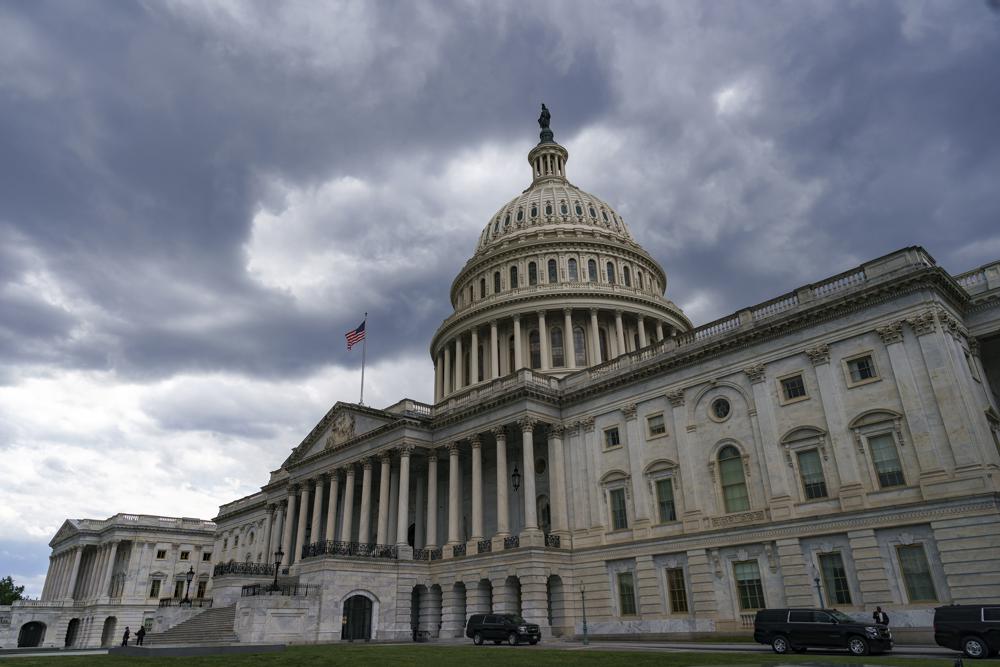
A combative Rep. Liz Cheney lashed out at leaders of her own Republican Party late Tuesday, taking to the House floor on the eve of her near-certain ouster from a leadership post to warn that former President Donald Trump and his GOP supporters are threatening to “undermine our democracy.” In an abruptly announced evening appearance in a nearly empty House chamber, Cheney, R-Wyo., cast herself as a defender of the Constitution. Her four-minute speech also served notice that she had no intention of backing down in her battle against a former president who has retained loyalty among many GOP lawmakers and voters, even as it leaves her once-promising political career in question. “Remaining silent and ignoring the lie emboldens the liar,” she said, adding, “I will not sit back and watch in silence while others lead our party down a path that abandons the rule of law and joins the former president’s crusade to undermine our democracy.” Cheney has for weeks faced calls for her ouster from her leadership job after her repeated public rejection of Trump’s false claim that he lost his reelection bid last November because of widespread cheating. She’s also insistently blamed him for inciting supporters who stormed the Capitol on Jan. 6, resulting in five deaths, even as other Republicans have sought to downplay the attack. That stance has angered many Republicans who say that as her party’s No. 3 House leader, she should focus on messages that would help the party win House control in next year’s elections, not on internal party divisions over the former president. GOP lawmakers plan to meet Wednesday behind closed doors and are expected to strip her of her leadership job and ultimately replace her with Rep. Elise Stefanik, R-N.Y., a Trump loyalist. The widespread GOP opposition to Cheney’s stubborn stance has created a jaw-dropping moment in which one of the country’s two major parties is insisting on acceptance of, or silence about, the former president’s falsehoods as the price of remaining in Republican leadership. “Millions of Americans have been misled by the former president,” Cheney said. “They have heard only his words, but not the truth as he continues to undermine our democratic process, sowing seeds of doubt about whether democracy really works at all.” The latest spike in hostilities was prompted last week when Trump released a statement saying, “The Fraudulent Presidential Election of 2020 will be, from this day forth, known as THE BIG LIE!” On Tuesday, Cheney said: “Today, we face a threat America has never seen before. A former president who provoked a violent attack on this Capitol, in an effort to steal the election, has resumed his aggressive effort to convince Americans that the election was stolen from him. He risks inciting further violence.” Trump foes have been using “the big lie” to describe his repetition of his fallacious claim that the election was fraud-ridden. State and local agencies and courts around the country have found no evidence that Trump lost due to cheating. Cheney did not mention her GOP adversaries by name. House Minority Leader Kevin McCarthy, R-Calif., and No. 2 House Republican Steve Scalise, R-La., have called for her removal and are supporting Stefanik to replace her. Cheney is the daughter of former Vice President Dick Cheney. Her career had defined her firmly as an old-school conservative GOP figure, advocating for tax cuts and an assertive U.S. presence abroad. She criticized Trump at times during his presidency. But their relationship plummeted after she became one of just 10 House Republicans to vote for impeaching him for inciting his backers to invade the Capitol as Congress formally certified now-President Joe Biden’s electoral college victory. Republished with the permission of the Associated Press.
Dem-led House, drawing a line, kicks Marjorie Taylor Greene off committees

A fiercely divided House tossed Rep. Marjorie Taylor Greene off both her committees Thursday, an unprecedented punishment that Democrats said she’d earned by spreading hateful and violent conspiracy theories. Underscoring the political vise her inflammatory commentary has clamped her party into, nearly all Republicans voted against the Democratic move but none defended her lengthy history of outrageous social media posts. Yet in a riveting moment, the freshman Republican from a deep-red corner of Georgia took to the House floor on her own behalf. She offered a mixture of backpedaling and finger-pointing as she wore a dark mask emblazoned with the words “FREE SPEECH.” The chamber’s near party-line 230-199 vote was the latest instance of conspiracy theories becoming pitched political battlefields, an increasingly familiar occurrence during Donald Trump’s presidency. He faces Senate trial next week for his House impeachment for inciting insurrection after a mob he fueled with his false narrative of a stolen election attacked the Capitol. Thursday’s fight also underscored the uproar and political complexities that Greene — a master of provoking Democrats, promoting herself, and raising campaign money — has prompted since becoming a House candidate last year. Eleven Republicans joined 219 Democrats in backing Greene’s ejection from her committees, while 199 GOP lawmakers voted “no.” Addressing her colleagues, Greene tried to dissociate herself from her “words of the past.” Contradicting past social media posts, she said she believes the 9-11 attacks and mass school shootings were real and no longer believes QAnon conspiracy theories, which include lies about Democratic-run pedophile rings. But she didn’t explicitly apologize for supportive online remarks she’s made on other subjects, as when she mulled about House Speaker Nancy Pelosi being assassinated or the possibility of Jewish-controlled space rays causing wildfires. And she portrayed herself as the victim of unscrupulous “big media companies.” News organizations “can take teeny, tiny pieces of words that I’ve said, that you have said, any of us, and can portray us as someone that we’re not,” she said. She added that “we’re in a real big problem” if the House punished her but tolerated “members that condone riots that have hurt American people” — a clear reference to last summer’s social justice protests that in some instances became violent. Greene was on the Education and Labor committee and the Budget committee. Democrats were especially aghast about her assignment to the education panel, considering the past doubt she cast on school shootings in Florida and Connecticut. The political imperative for Democrats was clear: Greene’s support for violence and fictions were dangerous and merited punishment. Democrats and researchers said there was no apparent precedent for the full House removing a lawmaker from a committee, a step usually taken by their party leaders. The calculation was more complicated for Republicans. Though Trump left the White House two weeks ago, his devoted followers are numerous among the party’s voters, and he and Greene are allies. Minority Leader Kevin McCarthy, R-Calif., hopes GOP victories in the 2022 elections will make him speaker. Republicans could undermine that scenario by alienating Trump’s and Greene’s passionate supporters, and McCarthy took no action to punish her. “If any of our members threatened the safety of other members, we’d be the first ones to take them off a committee,” Pelosi angrily told reporters. She said she was “profoundly concerned” about GOP leaders’ acceptance of an “extreme conspiracy theorist.” At one point, No. 2 Democratic leader Steny Hoyer of Maryland strode to the GOP side of the chamber carrying a poster of a Greene Facebook post from last year. “Squad’s Worst Nightmare,” Greene had written in the post, which showed her holding an AR-15 firearm next to pictures of three of the four Democratic lawmakers, all young women of color, who’ve been nicknamed “The Squad.” “They are people. They are our colleagues,” Hoyer said. He mimicked Greene’s pose holding the weapon and said, “I have never, ever seen that before.” Republicans tread carefully but found rallying points. McCarthy said Greene’s past opinions “do not represent the views of my party.” But without naming the offenders, he said Pelosi hadn’t stripped committee memberships from Democrats who became embroiled in controversy. Among those he implicated was Rep. Ilhan Omar, D-Minn., who made anti-Israel insults for which she later apologized. “If that’s the new standard,” he said of Democrats’ move against Greene, “we have a long list.” Rep. Tom Cole, R-Okla., said Democrats were setting a precedent by punishing lawmakers for statements made before they were even candidates for Congress. Rep. Jim Jordan, R-Ohio, warned, “You engage in wrong-speak, you’re in the Thunder Dome,” a term for an enclosed wrestling arena. Committee assignments are crucial for lawmakers for shaping legislation affecting their districts, creating a national reputation, and raising campaign contributions. Even social media stars like Greene could find it harder to define themselves without the spotlights that committees provide. Not all Republicans were in forgiving moods, especially in the Senate. There, fringe GOP candidates have lost winnable races in recent years and leaders worry a continued linkage with Trump and conspiracists will inflict more damage. That chamber’s minority leader, Mitch McConnell, R-Ky., this week called Greene’s words a “cancer” on the GOP and country. On Thursday, No. 2 Senate GOP leader John Thune of South Dakota amplified that thinking. Thune said House Republicans needed to issue a “really strong” rebuke of Greene’s conspiratorial formulations. Republicans must “get away from members dabbling in conspiracy theories,” Thune said. “I don’t think that’s a productive course of action or one that’s going to lead to much prosperity politically in the future.” The fight came a day after Republicans resolved another battle and voted to keep Rep. Liz Cheney, R-Wyo., in their leadership. Pro-Trump conservatives tried removing her because she supported Trump’s impeachment. The House resolution punishing Greene was barely over a page. It said House rules require lawmakers’ behavior to “reflect credibly” on the chamber and said Greene should be removed “in light of conduct she has exhibited.” News organizations have unearthed
House Democrats mount effort to punish Georgia Rep. Marjorie Taylor Greene

House Democrats are mounting an effort to formally rebuke Rep. Marjorie Taylor Greene, a newly elected Georgia Republican with a history of making racist remarks, embracing conspiracy theories, and endorsing violence directed at Democrats. Democrats have teed up action Wednesday to send a resolution to the House floor that would strip Greene of assignments on the House education and budget committees, if House Minority Leader Kevin McCarthy, R-Calif., doesn’t do so first. “It is my hope and expectation that Republicans will do the right thing and hold Rep. Greene accountable, and we will not need to consider this resolution,” said House Majority Leader Steny Hoyer, D-Md. “But we are prepared to do so if necessary.” Some Democrats have called for going further and expelling Greene from the House — an unlikely outcome that would require backing from Republicans since expulsion requires a two-thirds vote. Another option is censure. Democrats’ willingness to act against a member of the opposing party underscores their desire to confront far-right politicians, like Greene, who are closely aligned with some of former President Donald Trump’s fringe supporters, including extremist groups that were involved in the violent Capitol insurrection. It also shines a light on the GOP’s reluctance to punish Trump supporters in their ranks for fear of alienating some of the former president’s most ardent voters. “If Republicans won’t police their own, the House must step in,” said Rep. Debbie Wasserman Schultz, D-Fla., who is sponsoring the measure to remove Greene from the committees. In a tweet over the weekend, Greene sounded a defiant tone. She also said she had spoken to Trump and was “grateful for his support.” “I will never back down and will stand up against the never-ending bloodthirsty mob,” she tweeted. On Monday, she tweeted that Democrats, if they move forward, will come to regret the “precedent they are setting,” arguing that it would be “used extensively against members on their side once we regain the majority after the 2022 elections.” Greene’s views were in the spotlight even before she joined the House last month. The Georgia Republican has expressed support for QAnon conspiracy theories, which focus on the debunked belief that top Democrats are involved in child sex trafficking, Satan worship, and cannibalism. Facebook videos surfaced last year showing she’d expressed racist, anti-Semitic, and anti-Muslim views. Top Republicans denounced her at the time, hoping to block her from capturing the GOP nomination in her reliably red congressional district in northwest Georgia. But after she won her primary, they largely accepted her. Since then, even more of her past comments, postings, and videos have been unearthed, though many were deleted recently after drawing attention. She “liked” Facebook posts that advocated violence against Democrats and the FBI. One suggested shooting House Speaker Nancy Pelosi in the head. In response to a post raising the prospect of hanging former President Barack Obama, Greene responded that the “stage is being set.” In an undated video posted online, Greene floated a conspiracy theory that falsely suggests that the 2017 mass shooting that killed 58 people at a country music festival in Las Vegas could have been a false flag operation to build support for gun control legislation. “How do you get avid gun owners and people that support the Second Amendment to give up their guns and go along with anti-gun legislation?” Greene said in the video. “You make them scared, you make them victims and you change their mindset, and then possibly you can pass anti-gun legislation. Is that what happened in Las Vegas?” She also “liked” a Facebook post that challenged the veracity of a 2012 mass shooting at Sandy Hook Elementary School in Newtown, Connecticut. Another video captured her confronting Parkland school shooting survivor David Hogg. After her election, she seized on Trump’s false claims that the election was stolen and cheered on his supporters the day before the Capitol was stormed. “It’s our 1776 moment!” she posted on the conservative friendly social media platform Parler. Last week, Pelosi pressed for House Republicans to take action against Greene. “Assigning her to the education committee, when she has mocked the killing of little children” in Newtown, “what could they be thinking, or is thinking too generous a word for what they might be doing?” Pelosi said of Republican leaders. “It’s absolutely appalling.” McCarthy is supposed to meet privately with Greene this week. A spokesperson for the Republican leader declined to comment on Monday. Although it’s not certain he will take action against Greene, McCarthy has punished members of the House Republican caucus before. Former Rep. Steve King, R-Iowa, was stripped of all his committee assignments after expressing support for white supremacists in 2019. Wasserman Schultz acknowledged Monday that it had long been left up to leaders to remove members of Congress of their own party of their committee assignments. But she said Republicans’ reluctance to take action left Democrats with little choice. “Rep. Greene’s appalling behavior both before her election and during her term has helped fuel domestic terrorism, endangered lives of her colleagues, and brought shame on the entire House of Representatives,” Wasserman Schultz said. “Based on her actions and statements and her belligerent refusal to disavow them, she should not be permitted to participate in the important work of these two influential committees.” Republished with the permission of the Associated Press.
Donald Trump impeached after Capitol riot in historic second charge

President Donald Trump was impeached by the U.S. House for a historic second time Wednesday, charged with “incitement of insurrection” over the deadly mob siege of the Capitol in a swift and stunning collapse of his final days in office. With the Capitol secured by armed National Guard troops inside and out, the House voted 232-197 to impeach Trump. The proceedings moved at lightning speed, with lawmakers voting just one week after violent pro-Trump loyalists stormed the U.S. Capitol after the president’s calls for them to “fight like hell” against the election results. Ten Republicans fled Trump, joining Democrats who said he needed to be held accountable and warned ominously of a “clear and present danger” if Congress should leave him unchecked before Democrat Joe Biden’s inauguration Jan. 20. Trump is the only U.S. president to be twice impeached. It was the most bipartisan presidential impeachment in modern times, more so than against Bill Clinton in 1998. The Capitol insurrection stunned and angered lawmakers, who were sent scrambling for safety as the mob descended, and it revealed the fragility of the nation’s history of peaceful transfers of power. The riot also forced a reckoning among some Republicans, who have stood by Trump throughout his presidency and largely allowed him to spread false attacks against the integrity of the 2020 election. House Speaker Nancy Pelosi invoked Abraham Lincoln and the Bible, imploring lawmakers to uphold their oath to defend the Constitution from all enemies, foreign “and domestic.” She said of Trump: “He must go, he is a clear and present danger to the nation that we all love.” Holed up at the White House, watching the proceedings on TV, Trump took no responsibility for the bloody riot seen around the world, but issued a statement urging “NO violence, NO lawbreaking and NO vandalism of any kind” to disrupt Biden’s ascension to the White House. In the face of the accusations against him and with the FBI warning of more violence, Trump said, “That is not what I stand for, and it is not what America stands for. I call on ALL Americans to help ease tensions and calm tempers.” Trump was first impeached by the House in 2019 over his dealings with Ukraine, but the Senate voted in 2020 acquit. He is the first to be impeached twice. None has been convicted by the Senate, but Republicans said Wednesday that could change in the rapidly shifting political environment as officeholders, donors, big business and others peel away from the defeated president. The soonest Republican Senate leader Mitch McConnell would start an impeachment trial is next Tuesday, the day before Trump is already set to leave the White House, McConnell’s office said. The legislation is also intended to prevent Trump from ever running again. McConnell believes Trump committed impeachable offenses and considers the Democrats’ impeachment drive an opportunity to reduce the divisive, chaotic president’s hold on the GOP, a Republican strategist told The Associated Press on Wednesday. McConnell told major donors over the weekend that he was through with Trump, said the strategist, who demanded anonymity to describe McConnell’s conversations. In a note to colleagues Wednesday, McConnell said he had “not made a final decision on how I will vote.” Unlike his first time, Trump faces this impeachment as a weakened leader, having lost his own reelection as well as the Senate Republican majority. Even Trump ally Kevin McCarthy, the House Republican leader, shifted his position and said Wednesday the president bears responsibility for the horrifying day at the Capitol. In making a case for the “high crimes and misdemeanors” demanded in the Constitution, the four-page impeachment resolution approved Wednesday relies on Trump’s own incendiary rhetoric and the falsehoods he spread about Biden’s election victory, including at a rally near the White House on the day of the Jan. 6 attack on the Capitol. A Capitol Police officer died from injuries suffered in the riot, and police shot and killed a woman during the siege. Three other people died in what authorities said were medical emergencies. The riot delayed the tally of Electoral College votes which was the last step in finalizing Biden’s victory. Ten Republican lawmakers, including third-ranking House GOP leader Liz Cheney of Wyoming, voted to impeach Trump, cleaving the Republican leadership, and the party itself. Cheney, whose father is the former Republican vice president, said of Trump’s actions summoning the mob that “there has never been a greater betrayal by a President” of his office. Trump was said to be livid with perceived disloyalty from McConnell and Cheney. With the team around Trump hollowed out and his Twitter account silenced by the social media company, the president was deeply frustrated that he could not hit back, according to White House officials and Republicans close to the West Wing who weren’t authorized to speak publicly about private conversations. From the White House, Trump leaned on Sen. Lindsey Graham of South Carolina to push Republican senators to resist, while chief of staff Mark Meadows called some of his former colleagues on Capitol Hill. The president’s sturdy popularity with the GOP lawmakers’ constituents still had some sway, and most House Republicans voted not to impeach. Security was exceptionally tight at the Capitol, with tall fences around the complex. Metal-detector screenings were required for lawmakers entering the House chamber, where a week earlier lawmakers huddled inside as police, guns drawn, barricade the door from rioters. “We are debating this historic measure at a crime scene,” said Rep. Jim McGovern, D-Mass. During the debate, some Republicans repeated the falsehoods spread by Trump about the election and argued that the president has been treated unfairly by Democrats from the day he took office. Other Republicans argued the impeachment was a rushed sham and complained about a double standard applied to his supporters but not to the liberal left. Some simply appealed for the nation to move on. Rep. Tom McClintock of California said, “Every movement has a lunatic fringe.” Yet Democratic Rep. Jason Crow, D-Colo. and others recounted the harrowing
Additional GOP leader backs Donald Trump impeachment as tide grows
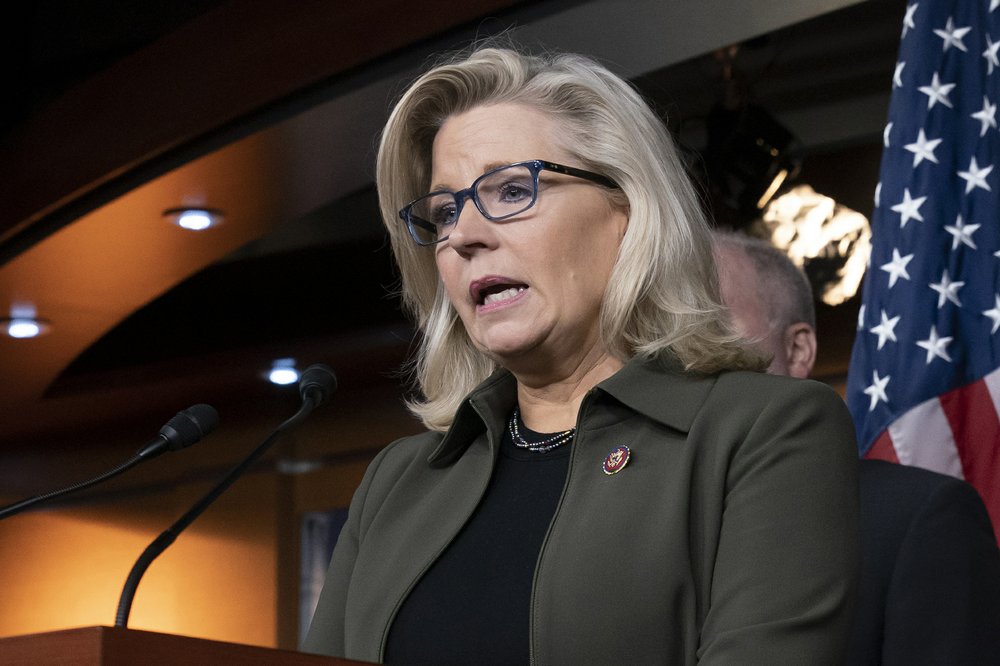
Republican opposition to impeaching President Donald Trump began crumbling at the party’s upper echelons on Tuesday as the No. 3 House GOP leader said she would vote to impeach Trump. “There has never been a greater betrayal by a President of the United States of his office and his oath to the Constitution,” Rep. Liz Cheney, R-Wyo., said in a statement that, while not unexpected, shook Congress as lawmakers prepared for a Wednesday House vote. With Democrats commanding that chamber, a vote impeaching Trump for an unprecedented second time seemed certain. More ominously for a president clinging to his final week in office, The New York Times reported that influential Senate Majority Leader Mitch McConnell thinks Trump committed an impeachable offense and is glad Democrats are moving against him. Citing unidentified people familiar with the influential Kentucky Republican’s thinking, the Times reported McConnell believes moving against Trump will help the GOP forge a future independent of the divisive, chaotic president. McConnell thinks Trump’s behavior before last week’s assault on the Capitol by fuming Trump supporters cost Republicans their Senate majority in two Georgia runoff elections, the newspaper reported. That’s a sentiment shared by many Republicans about Trump, who rather than focusing on bolstering Georgia’s two sitting GOP senators spent the last weeks of their campaign reciting his false narrative that his own reelection was ruined by Democratic election fraud. McConnell is said to be angry at the president over the insurrection at the Capitol and the twin defeats in Georgia that cost the party its Senate majority, according to a Republican granted anonymity to discuss the situation. Cheney, daughter of former Vice President Dick Cheney, has run afoul of Trump and far-right Republicans over the years on issues like wearing a facemask and withdrawing troops from Syria. She’s respected by mainstream conservatives and is one of the GOP’s few House female stars. “Good for her for honoring her oath of office,” House Speaker Nancy Pelosi, D-Calif., told reporters when asked about Cheney’s decision. “Would that more Republicans would honor their oaths of office.” Lawmakers’ oath includes a vow to defend the Constitution “against all enemies, foreign and domestic.” Reps. Adam Kinzinger, R-Ill., an Air Force veteran, and John Katko, R-N.Y., a former federal prosecutor, became the first rank-and-file GOP lawmakers to say they would vote to impeach Trump. Later joining the GOP faction was Rep. Fred Upton, R-Mich. The House will vote on an impeachment article charging Trump with incitement of insurrection over his goading of a pro-Trump crowd that poured past police lines into the Capitol last Wednesday, disrupting lawmakers’ ceremonial counting of the electoral votes that sealed Trump’s defeat, leaving five dead and widespread damage. “There is no doubt in my mind that the President of the United States broke his oath of office and incited this insurrection,” Kinzinger said in a statement about Trump, whom he’s repeatedly criticized over the years. In a statement, Upton said: “Congress must hold President Trump to account and send a clear message that our country cannot and will not tolerate any effort by any President to impede the peaceful transfer of power from one President to the next.” “To allow the president of the United States to incite this attack without consequence is a direct threat to the future of our democracy,” Katko said in a statement. “For that reason, I cannot sit by without taking action” and backing impeachment. In remarks to his supporters outside the White House before they streamed to the Capitol, Trump told them “this is the time for strength,” adding, “We got to get rid of the weak Congress people,” describing them as “the Liz Cheneys of the world.” Republicans have said they expected perhaps 10 House GOP lawmakers to break ranks and vote with Democrats to impeach Trump, and a clear majority of Republicans seem likely to stand by him. But Trump may not have helped himself Tuesday. In his first public appearance since the attack on the Capitol, he took no responsibility for his role in egging on his supporters and added falsely, “People thought that what I said was totally appropriate.” House Minority Leader Kevin McCarthy, R-Calif., has told his colleagues that he believes impeaching Trump would be wrong but has not ruled out censuring him or taking other steps. House GOP leaders say they won’t press their colleagues on how they will vote Wednesday. In its story, the Times did not say how McConnell would vote in a Senate trial to convict Trump. Such a finding would usually result in a president’s removal from office, but in this case it seems unlikely a trial could be held and concluded before Jan. 20, when Democrat Joe Biden will be inaugurated to replace him. McConnell has been the engine that has driven Trump’s Supreme Court appointees and scores of other federal judicial nominees through the chamber. While seldom criticizing Trump, he often resorts to silence when pressed by reporters on some of Trump’s more outrageous statements and their relationship has never seemed warm. One White House official said McConnell and Trump last spoke in in mid-December. Republished with the permission of the Associated Press.
What mandate? Joe Biden’s agenda faces a divided Congress
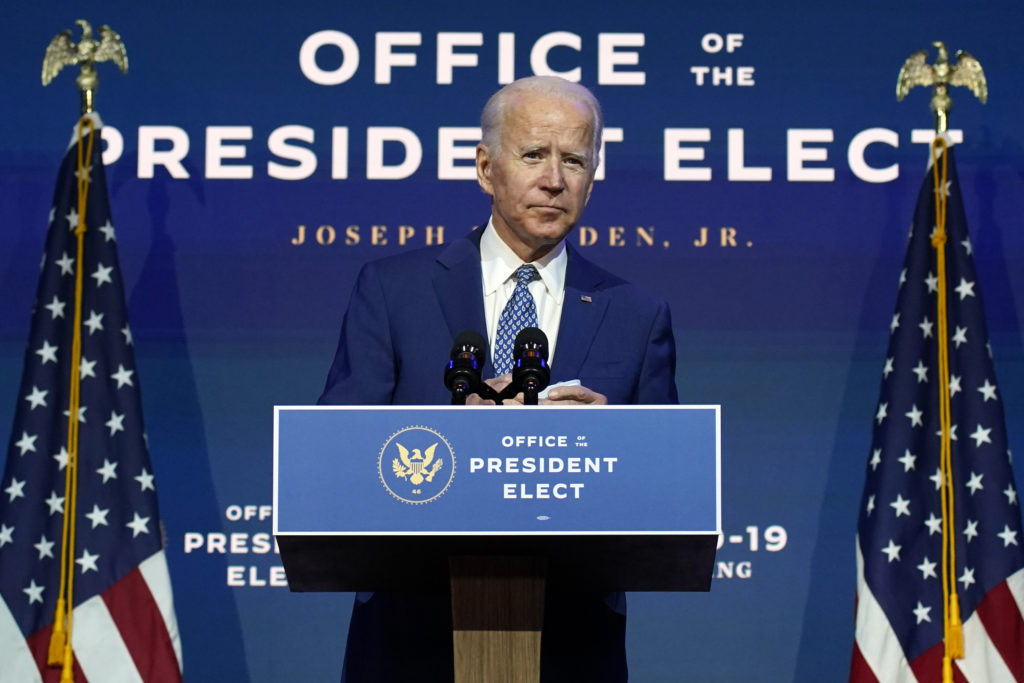
President-elect Joe Biden wants to “restore the soul of America.” First, he’ll need to fix a broken and divided Congress. Biden is rushing headlong into a legislative branch ground down by partisanship, name-calling and, now, a refusal by some to acknowledge his win over President Donald Trump. Democratic allies, struggling to regroup after their own election losses, harbor deep divisions between progressive and moderate voices. Republicans, rather than graciously congratulating the incoming president, are, intentionally or not, delegitimizing Biden’s presidency while catering to Trump’s refusal to accept the election results. At a time when the country needs a functioning government perhaps more than ever to confront the crises of COVID-19, a teetering economy and racial injustice, Washington is being challenged by the president-elect to do better than it has. It’s going to be a hard opening. “The country used to want gridlock because they saw gridlock as a way to protect them. Now the country’s actually hungry for action and progress,” said Jesse Ferguson, a Democratic strategist. “That’s a mandate to flip the switch.” The idea of a Biden mandate, though, is relative, certainly embraced by Democrats who want to push ahead with his agenda. Emboldened Republicans, though, who didn’t lose a single House seat, but in fact expanded their ranks and brushed back many Senate Democratic challengers, see their own mandate to serve as a block on a Biden agenda. California Rep. Kevin McCarthy, the House’s Republican leader, said the election “was a mandate against socialism,” stepping up the relentless GOP attacks, even though Biden is a centrist Democrat. Biden comes to the presidency like few in recent history, with a rare mix of experience but also a potentially divided Congress. Not since President George H.W. Bush has the White House had an executive with such a deep Washington resume. Rarely in modern times has a Democrat started an administration without a full Democratic Congress. While the House is in Democratic hands, the Senate remains undecided, a 50-48 lead for Republicans heading into a Jan. 5 runoff for two seats in Georgia that will determine party control. Asked this past week how he will be able to work with Republicans if they aren’t acknowledging his victory, Biden said, “They will.” What Biden is presenting is a new normal in Washington that he said voters demanded from the election. “If we can decide not to cooperate, then we can decide to cooperate,” he said at his election victory speech. Much has been made of Biden’s relationship with Capitol Hill, where he served as a senator for 36 years, particularly his deal-making as Barack Obama’s vice president with Senate Republican leader Mitch McConnell of Kentucky. Yet McConnell has not revived that approach as he enables Trump to delve into a legal battle rooted in unfounded allegations of voter fraud, even as state officials say the elections ran smoothly and there is no widespread evidence of fraudulent voting. McConnell won his own reelection in Kentucky. Whether McConnell emerges in the new Congress as majority or minority leader with a narrowly divided Senate, the longest serving Republican leader in history will have great leverage over legislation that arrives on Biden’s desk. Biden could seek a repeat of Newt Gingrich’s era when the Republican House speaker served up legislative victories for President Bill Clinton, infuriating Democrats with conservative budget and welfare bills but helping Clinton win a second term. Or Biden could find McConnell rerunning his politically charged GOP blockade of Obama’s agenda. Hopes of overcoming McConnell by ending the Senate filibuster, which would allow bills to advance on a simple majority rather than a 60-vote threshold, are slipping out of reach without Democratic control. “Gingrich insisted the American people wanted it,” said Rick Tyler, a former Gingrich top aide who left the Republican Party in the Trump era. He said McConnell will move on Biden’s agenda when Biden has the nation behind him. “That’s how you do it. Let’s see if Biden can do it,” he said. But it’s not just McConnell. House Speaker Nancy Pelosi, D-Calif., Senate Democratic leader Chuck Schumer of New York and even McCarthy will have oversize roles because of the changed makeup of the new Congress. Biden faces a restive liberal flank, powered by a new generation of high-profile progressives including Rep. Alexandria Ocasio-Cortez, D-N.Y., They helped deliver his victory and may not be so eager to compromise over health care, climate change, income inequality and racial justice issues that have growing popular support. At the same time, while Pelosi and Schumer have long histories with Biden, McCarthy is close to Trump, who is expected to hold a heavy influence on Republicans even after he leaves office. With a slimmer majority in the House, McCarthy’s ability to wrangle votes suddenly matters. “They can, but will they?” said Jim Kessler, a former Schumer aide and executive vice president at the center-left Third Way think tank. “This is a real veteran group of people. They know how to get things done. They know how to stop things from getting done.” An early test for Biden will be the Cabinet nominations, which can be approved by a slim 51 votes in the Senate. Republicans can also block nominees with time-consuming procedural hurdles that could quickly stall the new administration if top positions go unfilled. Democrats did as much to Trump, in some ways as payback after McConnell blocked Obama’s Supreme Court nominee Merrick Garland. “I think there’s a likelihood that Mitch McConnell will Merrick Garland every single Cabinet nominee and will force Joe Biden to negotiate on every single one,” said Sen. Chris Murphy, D-Conn. “Trump is still going to be running the Republican Party. And so, in reality, Joe Biden may have to negotiate every Cabinet pick with Donald Trump.” Republished with the permission of the Associated Press.
Donald Trump floats idea of election delay, a virtual impossibility
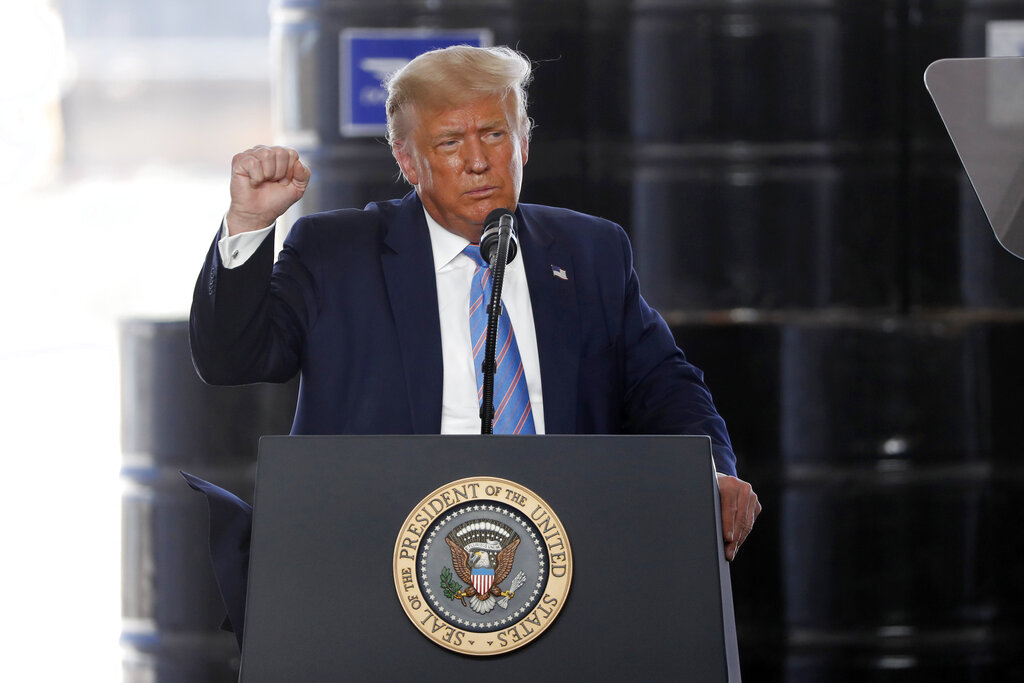
The date of the presidential election is enshrined in federal law and would require an act of Congress to change.
Donald Trump, Congress square off over virus aid as crisis worsens
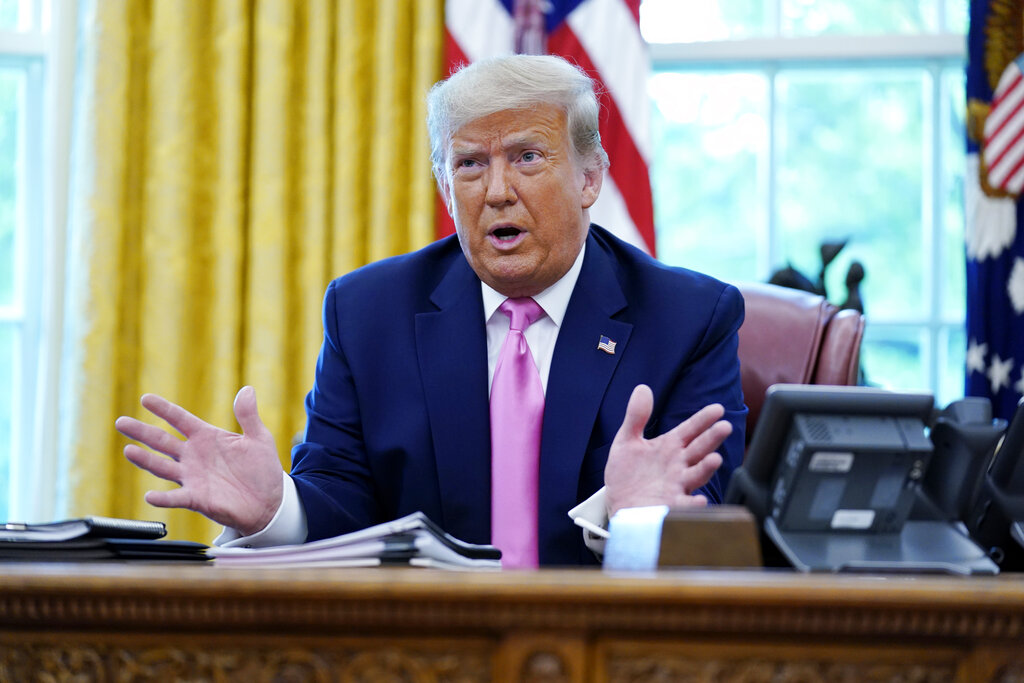
Trump convened GOP leaders at the White House as Senate Majority Leader Mitch McConnell prepared to roll out his $1 trillion package in a matter of days.


